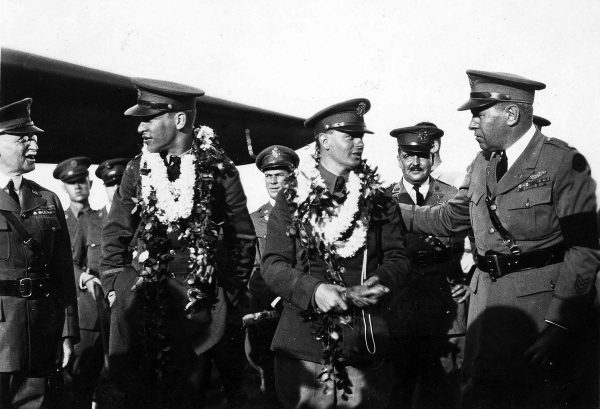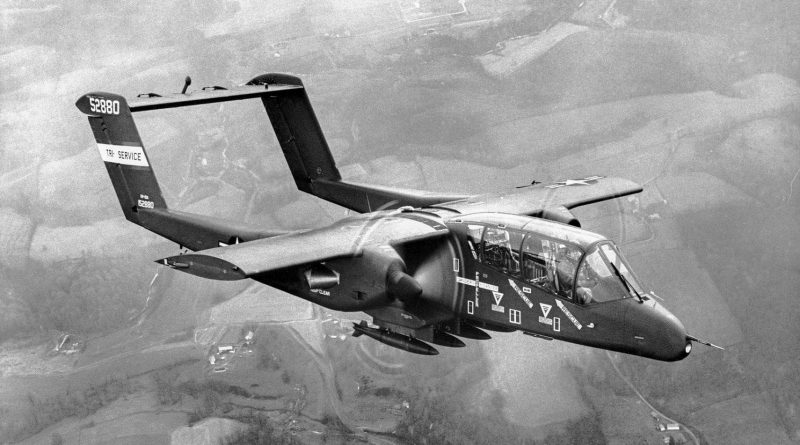June 29 in U.S. military history
1918: After the Bolsheviks seize power in Russia, 31 Marines from the armored cruiser USS Brooklyn (ACR-3) land at Vladivostok, Russia to guard the American Consulate and maintain stability in the Siberian port.
1927: Five weeks after Charles Lindbergh makes his famous flight across the Atlantic, an Atlantic-Fokker C-2 tri-motor aircraft touches down in Hawaii – completing the first transpacific flight from the United States to Hawaii. Numerous instrument failures force the crew, consisting of Army Air Corps first lieutenants Lester J. Maitland (pilot) and Albert F. Hegenberger (navigator), to rely on dead reckoning and celestial navigation. The men land safely at O’ahu’s Wheeler Field, making the daring 2,500-mile trip in 25 hours and 50 minutes.

1950: At a press conference, President Harry S. Truman calls the American involvement in the Korean War a “police action,’ adding that “We are not at war.”
Meanwhile, 18 B-26 Marauder bombers of the Fifth Air Force strike targets at Heijo Airport near the North Korean capitol of Pyongyang, destroying 25 communist aircraft on the ground and another Yak fighter in the air. Also, the cruiser USS Juneau (CLAA-119) and detroyer USS De Haven (DD-727) engage in the first naval shore bombardment of the war, destroying enemy shore installations near Bokuko Ko. And Gen. Douglas MacArthur personally witnesses P-51 Mustang pilots knock several Yak fighters out of the sky over Suwon Airfield while he meets with South Korean president Syngman Rhee.
1966: American warplanes bomb the cities of Hanoi and Haiphong for the first time, striking oil facilities.
To the south, Sgt. Charles B. Morris of the 173rd Airborne Brigade spots signs of enemy presence and crawls forward alone to observe. An enemy machine gunner spots him and hits Morris in the chest, but he fires back with his rifle and kills the enemy gunner, then knocks out the remaining crew with grenades. After reaching friendly lines – but before he can receive treatment for his wound – Morris springs back to action as the enemy mounts a large attack that turns into a fierce eight-hour battle.
The unit’s medic was killed, so Morris has to treat his own wound. As he attempts to administer treatment to his wounded soldiers, Morris is hit again. He regains consciousness and continues to direct his troops and treat the wounded until his left hand is crippled by an enemy grenade blast. Morris hurls grenades at enemy soldiers, killing several, then moves forward with another soldier to silence an enemy machine gun that had set up to the Americans’ rear. His comrade is killed, but Morris takes out the gun, despite only having one working hand. Not quite finished, he will put himself in the line of fire to drag the wounded to safety. For his incredible heroism, Sgt. Morris is awarded the Medal of Honor.
1968: During a large attack on his company’s defensive position, Pvt. 1st Class Frank A. Herda and another soldier hold their ground against a charge by 30 Vietnamese sappers. Just after a grenade fired by Herda hits an enemy soldier ten feet away in the head, Herda spots an enemy grenade at his feet. He hurls himself on the grenade and absorbs the blast, grievously wounding himself but saving his comrades. Today, he is one of just 72 surviving Medal of Honor recipients.
1972: When an enemy formation masses to attack American troops near Quang Tri, South Vietnam, OV-10 Bronco pilot Capt. Steven L. Bennett and his observer request artillery support. When the request is denied due to the proximity of friendly forces, Bennett makes four strafing runs on the enemy and breaks off their attack. However, a surface-to-air missile hits the plane, giving the airmen little choice but to eject. When Bennett learns his observer’s parachute is damaged, he decides to ditch the plane in the Gulf of Tonkin, even though no Bronco pilot has survived a ditching. When the plane impacts the water, Bennett is trapped inside the damaged cockpit but his observer is rescued. Bennett is posthumously awarded the Medal of Honor.
2014: The Islamic State (ISIS) establishes itself as a global caliphate, naming Abu Bakr al-Baghdadi as its leader. The former Al Qaeda-linked terrorist group controls territory in Iraq and Syria, but after their declaration, now claim authority over all Muslims worldwide.
